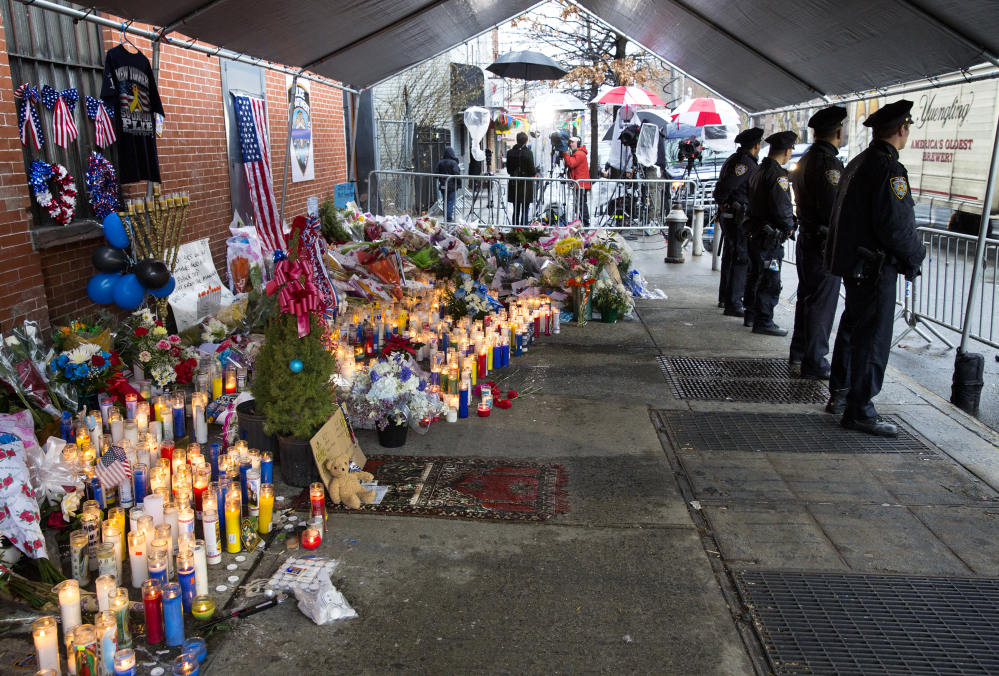New Yorkers marked the assassination of two police officers with a moment of silence on Tuesday as Mayor Bill de Blasio pressed the divided city to come together in their memory.
“Please embrace those around you as a symbol of our belief that we will move forward together,” said the mayor after the silence marking the moment when two officers were shot in an ambush on Saturday. He repeated his calls for the city to focus on the families of the officers slain in the shooting he called an attack on democracy and on every single New Yorker.
The shootings have strained relations between City Hall and some cops and reopened a debate about how a police department, often under fierce political strains, can deal with a civilian authority of elected officials.
New York Police Commissioner Bill Bratton took to the airways Tuesday morning to defend his department as some disgruntled police and De Blasio called a truce in their battle over responsibility for the shootings and recent anti-police protests to allow New York to mourn its dead.
“We’re in a very difficult place at the moment,” Bratton said on “CBS This Morning,” adding, “in the sense of officers’ feelings about the demonstrations, about the anti-police mood that seems to be sweeping the country of late, and it’s not easy being a cop in America today, the dangers that still exist despite crime having gone down fairly dramatically over the last 20 years.”
Bratton, whose city is mourning the weekend shootings of Officers Wenjian Liu and Rafael Ramos, defended his department and the man who rehired him, De Blasio, whose standing with police has never been high.
DEMONSTRATIONS MOUNT
“It’s a tough job, as we’ve seen, in some instances, a thankless job,” Bratton said. “Despite that, I’ll speak for my city – they’ve done a remarkable job, they’re keeping crime down, they’ve been restrained when face-to-face with demonstrators, you know, ‘Kill the cops’ and the language that’s directed at them.”
Bratton was referring to a series of demonstrations that began when a grand jury decided not to indict a Ferguson, Missouri, police officer in the shooting of an unarmed black man, Michael Brown.
The demonstrations accelerated when a Staten Island grand jury late last month decided not to indict a New York officer who used a chokehold to subdue Eric Garner, an unarmed black man. Garner died after the confrontation.
In the series of demonstrations, some protesters reviled city police. Breakaway demonstrators clashed on the Brooklyn Bridge on Dec. 13 and several officers, including two police lieutenants were injured, scraping nerves even more raw.
Bratton said the NYPD has ramped up security measures, including directing officers to work in teams and suspending auxiliary patrols, while investigators learn more about cop killer Ismaaiyl Brinsley, who committed suicide after fleeing the shooting scene in Brooklyn on Saturday.
In the case of Brinsley, Bratton said the NYPD is investigating questions including “where did he get his money? Who does he hang out with? He doesn’t seem to have been employed; he’s a couch crasher as they call it. … But he did seem to have money – cash in hundred dollar bills. So we’re checking very closely all of his relationships. What was his world like?”
Aside from the investigative details of the shooting, the polit ical fallout remains a question. The current truce to allow funerals for the slain officers will expire and De Blasio and union leaders will have to develop a working relationship, especially because union contracts will be negotiated this year.
FRICTION IS ‘NOTHING NEW’
At a news conference on Monday, Bratton challenged the media, who were questioning him and the mayor about City Hall’s relations with police.
“Can you point out to me one mayor who has not been battling with police unions in the last 50 years? Name one,” Bratton said. “The experience of this mayor of some cops not liking him, it’s nothing new.”
New York has often been the scene of fierce battles between its elected officials and public employees, especially police. Changes in the department to make it more accountable to civilian officials has led to problems.
For example, in 1992, when then-Mayor David Dinkins was pushing for a more independent civilian complaint review board, thousands of off-duty cops demonstrated at City Hall. The protest quickly turned into a riot where cops hurled racial epithets at the city’s black mayor.
Send questions/comments to the editors.



Success. Please wait for the page to reload. If the page does not reload within 5 seconds, please refresh the page.
Enter your email and password to access comments.
Hi, to comment on stories you must . This profile is in addition to your subscription and website login.
Already have a commenting profile? .
Invalid username/password.
Please check your email to confirm and complete your registration.
Only subscribers are eligible to post comments. Please subscribe or login first for digital access. Here’s why.
Use the form below to reset your password. When you've submitted your account email, we will send an email with a reset code.